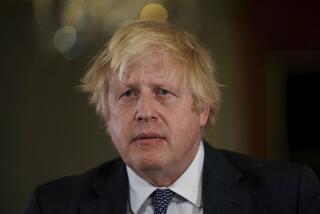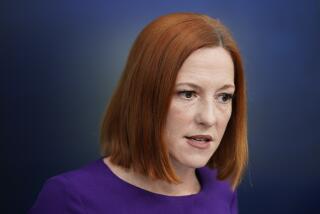Thatcher Press Secretary: Blunt, Powerful : Ingham Has Prime Minister’s Ear and Shows Policy-Making Muscle
LONDON — A framed quotation by Prime Minister Margaret Thatcher hangs in the Downing Street office of Bernard Ingham, her chief press secretary, citing a reply she once gave to a questioner in the House of Commons: “Mr. Ingham acts in accord with the duties of his office.”
That was Thatcher’s way of dealing with criticism that is often directed against Ingham, a bluff, bushy-browed, stocky man who is widely regarded as the most effective and powerful press secretary to a prime minister in recent history.
So high is his standing with Thatcher that he is believed to be influential in general policy making, as well as in matters concerning the media.
That standing has made Ingham, 52, one of the key figures in government, and the “duties of his office” are ever widening.
“Bernard is the greatest,” Thatcher told parliamentary colleagues at a social gathering not long ago.
And as the son of a Yorkshire weaver, Ingham has probably a better sense of the average Briton’s views and feelings than do most of the luminaries in Thatcher’s Conservative Party.
What endears him to his admirers in the press is his candor and forthrightness--in a time of blandness and image-polishing among media consultants. As he says, “I call a spade a bloody shovel.”
More important for the media, he has direct access to Thatcher, whom he may see several times a day in London and whom he accompanies on all her important domestic and foreign travels.
“Bernard accurately reflects the prime minister’s thinking,” says one correspondent who is a regular at Ingham’s briefings. “It’s uncanny. He shares all her views. And even more important, he doesn’t try to gloss over her beliefs and attitudes. From Bernard, you get the real Maggie Thatcher, prejudices and all.”
Thus, Ingham has nothing but contempt for most of Thatcher’s bogies--left-wing labor leaders, such as the mine workers’ Arthur Scargill, who he believes have sabotaged the trade union movement; Tory “wets,” or moderates, who he thinks leak anti-Thatcher stories to their media favorites; the Labor Party, which he believes is bent on self-destruction; the Foreign Office, which he thinks cozies up to Britain’s enemies; and just about anyone else who might have the temerity to criticize his boss.
Ingham doesn’t rattle easily, and he is not afraid to characterize Thatcher’s critics as “punch drunk” and their statements as “a load of rubbish.”
With his blunt language, Ingham is able to provide colorful background criticism of Thatcher’s political enemies--particularly those in her own party--in a way she would be reluctant to do in public.
His colorful, outspoken briefings, giving his version of events, have become a must at international conferences.
Part of Ingham’s effectiveness comes from his unwavering practice of dealing with the press on a not-for-attribution basis. Newspapers rarely quote him directly but rather as “sources close to the prime minister.”
A book with that title was written by a trio of Whitehall-watchers--Peter Hennessy, Michael Cockeral and David Walker--depicting Ingham as the most successful news manager, or manipulator, in government.
Ingham holds two regular meetings a day with the political correspondents of British newspapers--equivalent to a White House briefing--and they often rely on his guidance to tell their readers what the prime minister “really” thinks or plans to do.
Occasionally, his remarks become attributed, as they did when he described Labor Party spokesman Peter Shore’s comments as “bunkum and balderdash.” And the same thing occurred when he called another Labor Party leader’s statements “codswallop.”
Ingham’s outbursts were criticized recently by opposition members of Parliament, notably David Owen, leader of the Social Democratic Party.
The prime minister came quickly came to Ingham’s defense, declaring: “Mr. Ingham is fully within my instructions. He found characteristically colorful and vivid phrases with which to express them.”
Surprisingly, Ingham was not a political appointee of Thatcher’s. They had met only once before she selected the professional information officer to come to No. 10 Downing St. as her spokesman.
Born in 1932 in Hebdenbridge, Yorkshire, Ingham left high school at 16 to join the staff of a weekly newspaper.
In 1952, he joined the Yorkshire Post and in 1961 became its labor reporter in Leeds. The next year, he joined the Manchester Guardian as a labor writer and was remembered there for his sympathy for the Labor Party and his contempt for the Conservatives.
He once told a colleague: “The Tories would kick you in the teeth, and all you would say is, ‘Sorry, did I hurt your boot?’ ”
In 1965, he ran unsuccessfully as Labor’s candidate for a Leeds city council seat. He then moved to London as an industrial affairs reporter for the Guardian.
In 1967, Ingham left journalism for the civil service, becoming press officer for the Prices and Incomes Board and then for the Department of Employment. In 1974, he joined the new Department of Energy and worked in rapid succession for Conservative Lord Carrington and Laborites Eric Varley and Anthony Wedgwood Benn.
Loyal to His Boss
Ingham earned a reputation for enormous energy, informational skills and loyalty to the boss--of whatever political stripe.
After the Conservative Party’s election victory in 1975, he was recommended to the new prime minister by Whitehall experts as the best press officer in the government. So, she passed on naming a political crony and hired him.
Since then, he has continued to demonstrate his energy and loyalty--too much loyalty, in the view of some critics, because civil service information officers in Britain are supposed to be apolitical.
‘Delicate, Exposed Position’
Thatcher has said of Ingham: “He is in an especially delicate and exposed position. He is a public servant and a career civil servant; on the other hand, he is the principal spokesman for the prime minister, who is at one and the same time the head of the government and head of the political party.
“He inevitably operates in a political context and needs to possess a high degree of political awareness.”
Of his role, Ingham says: “I don’t indulge in party politics, and I make a point not to accompany the prime minister to party conferences.
“I speak on behalf of the prime minister as head of the government. I am an adviser on the presentation of policy. I also coordinate at the official level with the Cabinet minister responsible for information policy, currently Lord Whitelaw.
“But I also try to do my best for the prime minister and see that she is put in the most favorable light. We all do.”
Bridge, Not a Barrier
Unlike some previous press secretaries who detested the press and wound up not speaking to reporters, Ingham always maintains contact.
“I have sought to build a bridge between government and media rather than to erect a barrier,” he says, adding, “I am volcanic, but I don’t bear grudges.”
Under the British system, Cabinet ministers and their information officers have tended to run their own shops with little regard to whatever other departments may be doing in the same general field.
But during Britain’s war with Argentina over the Falkland Islands in 1982, Ingham insisted that various departments work together, and he used his personal muscle with the prime minister to force the Ministry of Defense to take reporters along on navy ships and to provide more information about what was going on in the South Atlantic war zone than the ministry’s bureaucrats wanted to divulge.
In a subsequent parliamentary inquiry into government news policy during the Falklands war, Ingham said: “I do not want to sound immodest, but I do think we had a pretty good relationship with our regular clientele (the press). I certainly took the view that when you are in a crisis of this kind, the last thing you do is withdraw your service to the media.”
After the war, Ingham flew with the prime minister to the Falklands and ensured that a British Broadcasting Corp. television crew, which had been filming there, stayed on for her top secret arrival.
Bucks the BBC
Then, he insisted that the film be shared with the commercial network, Independent Television. The BBC objected, but Ingham warned that no film would be transmitted back to Britain unless it was shared. The BBC capitulated.
Because of the Falklands experience, some critics say that he stage manages the prime minster’s appearances to ensure that only positive stories appear and that, further, he wants to become an overlord of all government information officers.
Ingham denies that he wishes to become an information “czar,” although he believes that often-inept civil servants charged with handling news should coordinate their efforts in the interest of coherent government.
In times of crisis, he says, he would like to be sure that “we all sing from the same sheet of music.”
Crossing the Line
The Social Democrats’ David Owen, in a letter to Thatcher, argued that Ingham had crossed the line between “information and propaganda.”
In reply, Ingham says: “My crucial stock in trade is reliability. Otherwise, I lack credibility and cease to be useful either to the government or the media.
“I take a skeptical view of anyone’s ability to manage the news so certainly and infallibly as to highlight the good and so assuredly as to bury the bad. For one thing, no government in a free society with a free press is in control of events or the news or its management or its presentation. I only wish I were as sophisticated, and devilishly clever and Machiavellian as some make out.”
Questions Objectivity
Ingham is skeptical of the objectivity of the major portion of the British press.
He told a meeting of editors: “I believe that the Watergate syndrome, combined with broadcasters’ confrontational approach to interviews, seems to require that any self-respecting reporter should knock seven bells out of symbols of authority and especially government. This goes beyond the normal in expected tension between government and press.
“Its effect on all our democracy is, in my view, corrosive. It means that government and especially central government is presumed guilty.
“In short, many journalists have fallen for the conspiracy theory of government.”
More to Read
Sign up for Essential California
The most important California stories and recommendations in your inbox every morning.
You may occasionally receive promotional content from the Los Angeles Times.










